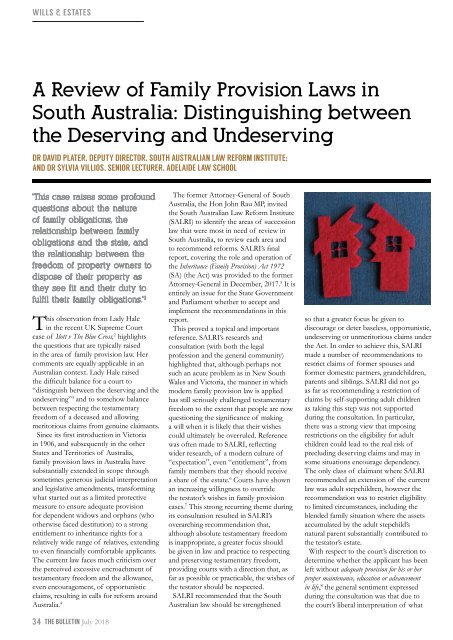LSB July 2018_Web
You also want an ePaper? Increase the reach of your titles
YUMPU automatically turns print PDFs into web optimized ePapers that Google loves.
WILLS & ESTATES<br />
A Review of Family Provision Laws in<br />
South Australia: Distinguishing between<br />
the Deserving and Undeserving<br />
DR DAVID PLATER, DEPUTY DIRECTOR, SOUTH AUSTRALIAN LAW REFORM INSTITUTE;<br />
AND DR SYLVIA VILLIOS, SENIOR LECTURER, ADELAIDE LAW SCHOOL<br />
‘This case raises some profound<br />
questions about the nature<br />
of family obligations, the<br />
relationship between family<br />
obligations and the state, and<br />
the relationship between the<br />
freedom of property owners to<br />
dispose of their property as<br />
they see fit and their duty to<br />
fulfil their family obligations.’ 1<br />
This observation from Lady Hale<br />
in the recent UK Supreme Court<br />
case of Ilott v The Blue Cross, 2 highlights<br />
the questions that are typically raised<br />
in the area of family provision law. Her<br />
comments are equally applicable in an<br />
Australian context. Lady Hale raised<br />
the difficult balance for a court to<br />
“distinguish between the deserving and the<br />
undeserving” 3 and to somehow balance<br />
between respecting the testamentary<br />
freedom of a deceased and allowing<br />
meritorious claims from genuine claimants.<br />
Since its first introduction in Victoria<br />
in 1906, and subsequently in the other<br />
States and Territories of Australia,<br />
family provision laws in Australia have<br />
substantially extended in scope through<br />
sometimes generous judicial interpretation<br />
and legislative amendments, transforming<br />
what started out as a limited protective<br />
measure to ensure adequate provision<br />
for dependent widows and orphans (who<br />
otherwise faced destitution) to a strong<br />
entitlement to inheritance rights for a<br />
relatively wide range of relatives, extending<br />
to even financially comfortable applicants.<br />
The current law faces much criticism over<br />
the perceived excessive encroachment of<br />
testamentary freedom and the allowance,<br />
even encouragement, of opportunistic<br />
claims, resulting in calls for reform around<br />
Australia. 4<br />
34 THE BULLETIN <strong>July</strong> <strong>2018</strong><br />
The former Attorney-General of South<br />
Australia, the Hon John Rau MP, invited<br />
the South Australian Law Reform Institute<br />
(SALRI) to identify the areas of succession<br />
law that were most in need of review in<br />
South Australia, to review each area and<br />
to recommend reforms. SALRI’s final<br />
report, covering the role and operation of<br />
the Inheritance (Family Provision) Act 1972<br />
(SA) (the Act) was provided to the former<br />
Attorney-General in December, 2017. 5 It is<br />
entirely an issue for the State Government<br />
and Parliament whether to accept and<br />
implement the recommendations in this<br />
report.<br />
This proved a topical and important<br />
reference. SALRI’s research and<br />
consultation (with both the legal<br />
profession and the general community)<br />
highlighted that, although perhaps not<br />
such an acute problem as in New South<br />
Wales and Victoria, the manner in which<br />
modern family provision law is applied<br />
has still seriously challenged testamentary<br />
freedom to the extent that people are now<br />
questioning the significance of making<br />
a will when it is likely that their wishes<br />
could ultimately be overruled. Reference<br />
was often made to SALRI, reflecting<br />
wider research, of a modern culture of<br />
“expectation”, even “entitlement”, from<br />
family members that they should receive<br />
a share of the estate. 6 Courts have shown<br />
an increasing willingness to override<br />
the testator’s wishes in family provision<br />
cases. 7 This strong recurring theme during<br />
its consultation resulted in SALRI’s<br />
overarching recommendation that,<br />
although absolute testamentary freedom<br />
is inappropriate, a greater focus should<br />
be given in law and practice to respecting<br />
and preserving testamentary freedom,<br />
providing courts with a direction that, as<br />
far as possible or practicable, the wishes of<br />
the testator should be respected.<br />
SALRI recommended that the South<br />
Australian law should be strengthened<br />
so that a greater focus be given to<br />
discourage or deter baseless, opportunistic,<br />
undeserving or unmeritorious claims under<br />
the Act. In order to achieve this, SALRI<br />
made a number of recommendations to<br />
restrict claims of former spouses and<br />
former domestic partners, grandchildren,<br />
parents and siblings. SALRI did not go<br />
as far as recommending a restriction of<br />
claims by self-supporting adult children<br />
as taking this step was not supported<br />
during the consultation. In particular,<br />
there was a strong view that imposing<br />
restrictions on the eligibility for adult<br />
children could lead to the real risk of<br />
precluding deserving claims and may in<br />
some situations encourage dependency.<br />
The only class of claimant where SALRI<br />
recommended an extension of the current<br />
law was adult stepchildren, however the<br />
recommendation was to restrict eligibility<br />
to limited circumstances, including the<br />
blended family situation where the assets<br />
accumulated by the adult stepchild’s<br />
natural parent substantially contributed to<br />
the testator’s estate.<br />
With respect to the court’s discretion to<br />
determine whether the applicant has been<br />
left without adequate provision for his or her<br />
proper maintenance, education or advancement<br />
in life, 8 the general sentiment expressed<br />
during the consultation was that due to<br />
the court’s liberal interpretation of what


















